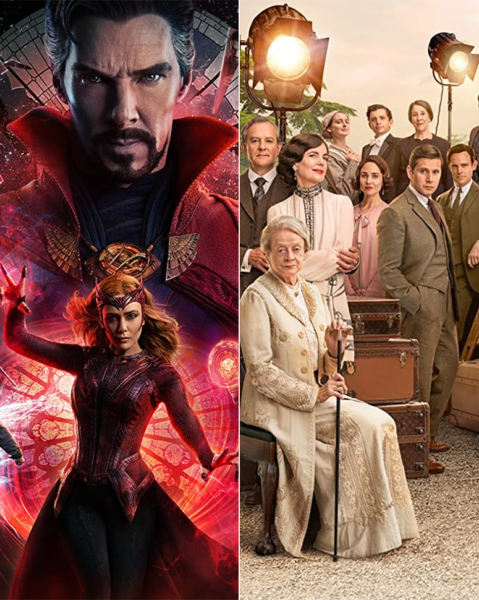
Abbey Road
Focus Features’ historical drama sequel Downton Abbey: A New Era opened in second place with $16.0M, on the lower end of pre-release projections. That’s -48% behind 2019’s original Downton Abbey ($31.0M).
The sequel is one of the few wide release films of the pandemic era aimed primarily at the over-40 audience. The estimated audience was 48% ages 55+. That’s significantly more than for some other pandemic-era films:
- West Side Story (26% ages 55+)
- The Last Duel (12% ages 55+)
- No Time to Die (36% ages 45+, which by definition means the audience ages 55+ was even lower than that)
The sequel’s audience was also 73% female, almost identical to the first film’s 74%.
After opening overseas starting a few weeks ago, A New Era has now earned $35.6M overseas, led by $15.0M in the U.K. and Ireland, for a $51.7M global total.
For comparison, all those numbers the U.K. so far significantly trail 2019’s original Downton Abbey, which finished with $36.5M in the U.K., $97.8M overseas, and $194.6M globally.
The sequel was released in China this weekend and made $865K, looking unlikely to match though 2019’s original Downton Abbey which made $3.2M there.
Y Chromosome
A24’s horror thriller Men opened in fifth place with $3.2M, on the lower end of pre-release projections.
This gives the independent distributor A24 two of this weekend’s top six films, as A24’s sci-fi comedy Everything Everywhere All at Once declines a mere -4% to $3.1M in sixth place.
Everything has now earned $52.2M, becoming the top film in the history of indie distributor A24, ahead of 2019’s Uncut Gems ($50.0M), 2017’s Lady Bird ($48.9M), and 2018’s Hereditary ($44.0M).
Doctor’s Orders
Disney and Marvel Studios’ superhero sequel Doctor Strange in the Multiverse of Madness easily maintained first place with a -48% decline to $31.6M.
After debuting with the #11 domestic opening of all time with $187.4M, then falling to the #31-largest second weekend of all time, it now falls again to the #49 third weekend ever.
With a $342.0M total through 17 days, through the equivalent point in release, it’s running:
- +88% ahead of 2016’s original Doctor Strange ($181.6M)
- +14% ahead of March’s The Batman ($300.0M)
- +13% ahead of 2017’s Guardians of the Galaxy Vol. 2 ($301.3M)
- +6% ahead of 2019’s Captain Marvel ($320.7M)
- +6% ahead of 2019’s Spider-Man: Far From Home ($319.8M)
- -1% behind 2016’s Captain America: Civil War ($347.2M)
- -8% behind 2015’s Avengers: Age of Ultron ($372.0M)
- -44% behind 2021’s Spider-Man: No Way Home, in which Doctor Strange was a key character ($613.6M)
Multiverse has now earned $461M overseas, for an $803M global total.
That beats the $678M global haul of 2016’s original Doctor Strange, and stands as the #2 MPA-rated (i.e. non-Chinese) film of the pandemic era, beating No Time to Die ($774M) and The Batman ($768M).
Top overseas markets to date include South Korea ($45.9M), U.K. ($43.8M), Mexico ($35.7M), Brazil ($29.2M), Australia ($23.0M), and France ($20.9M).
Multiverse has not yet opened in China, and no such release date in the world’s biggest film market has been announced. None of the other four Marvel titles from the past year were granted a Chinese release.
The Fire Burns Out
Universal’s horror remake and Stephen King novel adaptation Firestarter failed to spark last weekend with a fourth place bow of $3.8M, on the low end of the already low pre-release projections.
This weekend it falls -50% to $1.9M and seventh place, the steepest percentage drop among this frame’s top 10 films.
Firestarter marks Universal’s fourth experiment releasing a film day-and-date, with simultaneous releases in theaters and on Peacock. All four titles have underwhelmed at the box office, with most experiencing steep declines on their sophomore frames:
- February’s Marry Me (-53%), steeper than the four main romantic comedies in 2019, the pre-pandemic year: Long Shot (-36%), What Men Want (-41%), Last Christmas (-43%), and Isn’t It Romantic (-50%).
- October 2021’s Halloween Kills (-71%), steeper than 2018’s Halloween (-59%).
- July 2021’s The Boss Baby: Family Business (-45%), although that was actually slightly milder than for 2017’s original The Boss Baby (-47%).
However, Firestarter actually experienced milder decline than several of this past decade’s other Stephen King adaptations:
- 2017’s It (-51%)
- 2019’s It: Chapter Two (-57%)
- 2019’s Doctor Sleep (-57%)
- 2017’s The Dark Tower (-59%)
- 2013’s Carrie (-63%)
Weekend comparisons
Total box office this weekend came in around $73.2M, which is:
- -20% behind last weekend’s total ($91.6M), when Doctor Strange in the Multiverse of Madness led for a second consecutive frame with $61.7M.
- 2.7x the equivalent weekend in 2021 ($26,413,884), as the box office was taking its first pandemic-era steps back to normalcy and Spiral led with $8.7M.
- -50% behind the equivalent weekend in the last pre-pandemic year 2019 ($148.3M), when John Wick: Chapter 3 – Parabellum led with $56.8M.
YTD comparisons
Year-to-date box office stands around $2.42B. That’s:
- 4.5x this same point in the pandemic recovery year of 2021 ($527.6M).
- -41% behind this same point in 2019, the last pre-pandemic year ($4.14B).
Top distributors
As has been the case all year so far, the leading distributor in the domestic market remains Sony Pictures. The top five are:
- Sony Pictures ($484.9M)
- Warner Bros. ($473.4M)
- Paramount ($422.1M)
- Disney ($317.1M)
- Universal ($236.1M)
Note that Disney’s number excludes releases from subsidiary 20th Century Studios. Still, Disney seems poised to take the crown at some point this summer or possibly fall, with titles including Doctor Strange in the Multiverse of Madness, Lightyear, and Thor: Love and Thunder. Paramount is likely to briefly hold the title first, after the release of Top Gun: Maverick.


Share this post